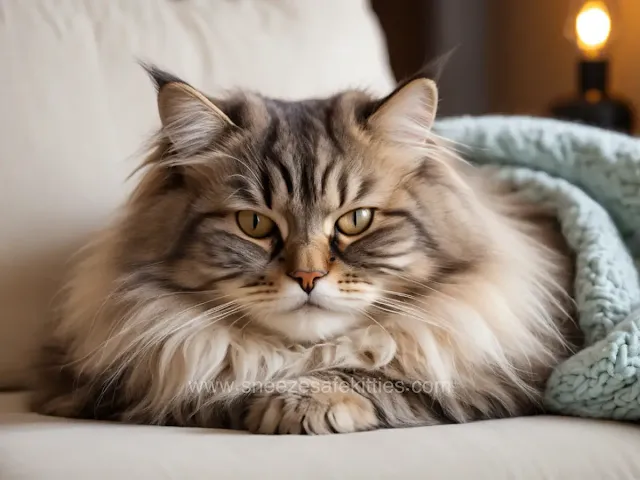Why Do Hypoallergenic Cats Sleep So Much?
 |
| Hypoallergenic Cats and their Relationship With Sleep |
Normal Sleep Patterns in Cats
Normal sleep patterns in cats are unique, as they are known to sleep for the majority of the day—typically.Average sleep duration for cats
Cats are well-known for their love of sleep, and for good reason. On average, adult cats sleep between 12 to 16 hours a day. This may seem excessive to us humans, but it's perfectly normal for our feline friends. Kittens and senior cats tend to sleep even more, often up to 20 hours a day.Factors influencing cat sleep cycles
Several factors can influence a cat's sleep cycle:- Age
- Diet
- Activity level
- Environmental stimuli
- Health conditions
Comparison of sleep patterns: hypoallergenic vs. regular cats
While hypoallergenic cats share many sleep characteristics with regular cats, there are some notable differences:1 Sleep Duration:
- Hypoallergenic Cats :May sleep 14-18 hours
- Regular Cats: Typically sleep 12-16 hours
- Hypoallergenic Cats: Longer deep sleep phases
- Regular Cats: Shorter deep sleep phases
- Hypoallergenic Cats: Less frequent, shorter bursts
- Regular Cats: More frequent, longer bursts
- Hypoallergenic Cats: Easier adaptation
- Regular Cats: Variable adaptation
Reasons for Increased Sleep in Hypoallergenic Cats
Increased sleep in hypoallergenic cats can occur for various reasons, many of which are normal and related to age, lifestyle, or health. As cats grow older, they naturally tend to sleep more due to reduced energy levels and activity. Environmental factors, such as a calm, quiet home or a lack of stimulating activities, may also lead to increased sleep. Additionally, hypoallergenic breeds, like Siberians or Balinese, might sleep more when they are bored or during colder months, conserving energy. However, excessive sleep can sometimes indicate underlying health issues, such as obesity, thyroid problems, or infections. If you notice a sudden or drastic change in your cat’s sleep patterns, consulting a vet is important to rule out any potential medical concerns.Benefits of Extended Sleep for Hypoallergenic Cats
Hypoallergenic cats, like their non-hypoallergenic counterparts, reap numerous advantages from their extended sleep patterns. Let's explore the specific benefits that these feline friends enjoy from their prolonged slumber.Enhanced Immune Function
Extended sleep plays a crucial role in bolstering the immune system of hypoallergenic cats. During deep sleep phases, their bodies produce cytokines, proteins that help fight infections and inflammation. This process is particularly important for hypoallergenic breeds, as it helps maintain their unique low-allergen characteristics.- Increased production of antibodies
- Better resistance to common feline illnesses
- Faster recovery from minor injuries or ailments
Improved Mood and Behavior
Adequate sleep contributes significantly to a cat's overall mood and behavior. For hypoallergenic cats, this is especially important as they are often chosen for their gentle and affectionate nature.Sleep Benefits:
- More relaxed and approachable
- Balanced hormones
- Increased playfulness
- Mental rejuvenation
- Enhanced social interactions
Better Overall Health
The extended sleep patterns of hypoallergenic cats contribute to their overall health in various ways:- Weight management: Proper sleep helps regulate metabolism and appetite
- Cardiovascular health: Deep sleep allows for heart rate variability, promoting heart health
- Muscle and tissue repair: Extended rest periods facilitate the body's natural healing processes
